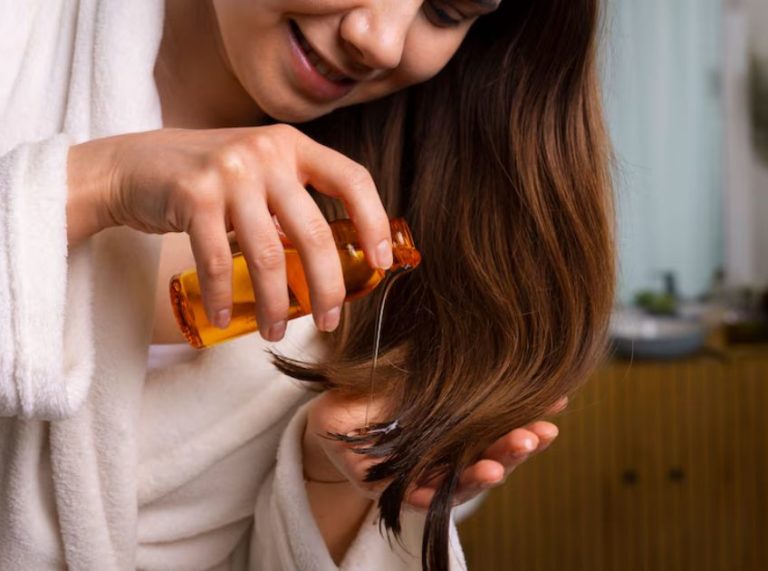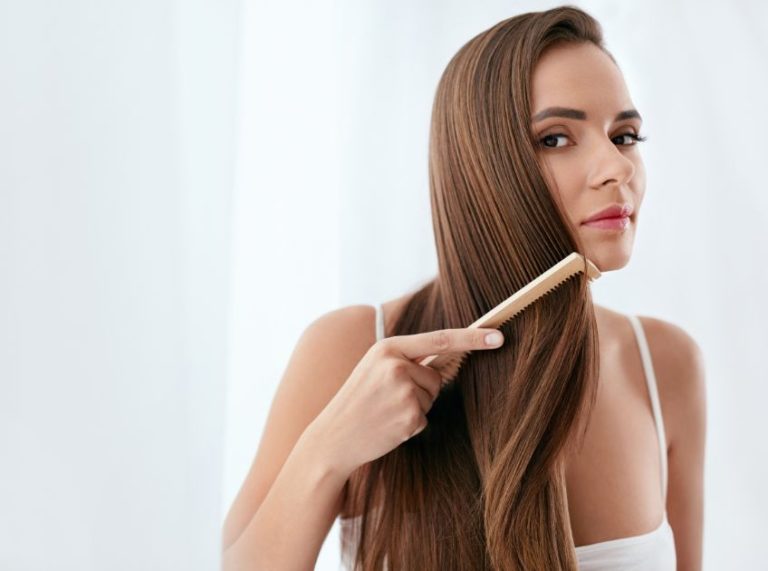
Important: This article is for informational purposes only. Please read our full disclaimer for more details.
Drying hair using a blow dryer or hair dryer is called blow drying hair. As hot air is directed to hair, the moisture present in it evaporates instantly, resulting in dry hair. Besides drying hair, blow drying is also done to achieve various hairstyles such as straight and curls, especially those that require adding volume to the hair.
When it comes to salon-quality blow drying of hair, none of us would say no to it. But the truth is, regular salon visits are not realistically possible. Getting it done regularly on a professional level in a salon requires a lot of money and time.
That is why we buy hair dryers so that we can blow-dry ourselves at home. But there are a few questions that always strike the mind, does blow drying your hair damage it, can you blow dry your hair daily and a lot more.
Is Blow-Drying Bad for Hair?

A blow dryer is a tool that works through electricity to generate heat that helps to dry out and style hair. When hair is exposed persistently to intense heat, it is undoubtedly going to cause damage to the hair (1).
However, blow drying is not completely bad for hair unless you do it correctly and use enough hair protection against heat. Along with these, there are many more precautionary measures that we will discuss in this article that one should consider while using hair dryers to avoid hair damage.
Our hair strand is made up of three layers: cuticle, cortex, and medulla. Cuticles act as the outermost layer that protects the inner layers. So, when the heat from blow drying causes damage, it is usually the cuticle that gets affected.
The hair cuticle can also tolerate damage within a limit, after which it is impossible to reverse the effect that caused split ends and frizz in the hair.
So, the simple answer to, does blow drying your hair damage it is YES.
In fact, any type of heat-styling tool is terrible for hair (2). The hot air, when blown into wet hair, incapacitates the cuticles, making them susceptible to breakage, dryness, and tangles.
Precautions to Take While Blow Drying
Even though the heat from a blow dryer or any other heat styling tool can damage your beautiful locks, there are ways to prevent it. Using few precautions, you can protect your hair from harm that a blow dryer can cause.
- Use a heat protectant: Whether you use a blow dryer every day or occasionally, you must start using a good heat protectant spray or serum before you start blow-drying your hair. The heat protectant creates a thermal barrier over the shafts, that is, it coats the hair strand, forming a thin layer around it to safeguard it against the heat directly. Additionally, it retains moisture and provides temporary structural support to the hair.
- Heat setting of a blow dryer: While blow drying, we tend to use the highest setting for the hair to dry faster. Although it gets the work done faster, it hurts the hair the most. We should not blow dry, dripping wet hair instantly. Instead, it would be best if you initially dried it using a towel and then, after a while, used the dryer in a low to medium setting. The higher the heat, the more damage. So, try to keep the setting to the lowest for maximum safety of hair.
- Use the nozzle and diffuser of the blow dryer: The nozzle and diffuser are attachments to your blow dryer that help attain a definite blow-drying effect. A wider attachment distributes more heat.
- Maintain proper distance: You should always blow dry keeping the dryer at least 6 to 8 inches away from the hair and start from the back to the front of the head. While this distance is considered safe for hair, it also allows even distribution of heat instead of only one section which is more damaging.
Other Safe Ways of Drying Hair

There is no correct or incorrect choice of drying your hair. Your method of drying hair is an individual choice and depends on your hair texture, preference, and the style you want to achieve. There are alternative ways that you can dry your hair with no heat usage and the least damage. They are:
- Air drying
- Towel drying
Conclusion
Blow drying is not 100% bad for your hair, as long as you are not doing it daily and your hair is not healthy enough to tolerate the heat. A good quality of hair dryer, heat protectant and brush can help to reduce the damage.
At the same time, keeping the right distance between your hair and blow dryer will prevent overheating and reduce the chances of drying out or frying of hair. Make sure you move the blow dryer continuously that again reduces the risks of damage and give even and smooth results.
Even though hair dryers are common hair tools that people use daily, they can damage hair when not used properly. So, either use them occasionally or take all the precautions to shield your hair from the harmful effects of blow drying.
Image Source : freepik
Related Articles
- Is a Cold Air Dryer Better for Your Hair? Pros & Cons
- 7 Best Hair Dryers For Fine Hair
- Why Does My Hair Dry So Fast?
- Top 10 Shampoos for Extremely Dry Hair: Revive & Repair with Women-Tested Formulas
- 7 Best Blow Dryers For 4C Hair
- 7 Best Blow Dryers For Natural Hair
- Can I Blow Dry My Hair After Dying It?
- What Happens If You Burn Your Hair With A Lighter?
- Does Wearing a Hat Damage Your Hair?
- Do Perms Cause Hair Loss & Hair Damage?
- Does Showering with Hot Water Damage Your Hair?
















